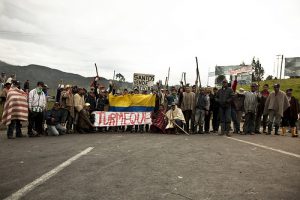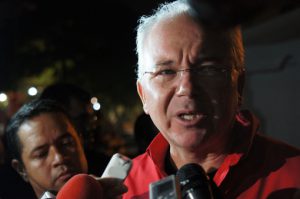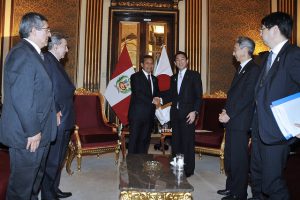Venezuela y la Corte Interamericana: ¿Un adiós, o un largo hasta luego?
El quinto piso del edificio de la Organización de Estados Americanos (OEA) alberga la biblioteca Rómulo Gallegos, designada de esta manera para hacer un homenaje al primer presidente de la Comisión Interamericana de Derechos Humanos (CIDH). Este es un significativo reconocimiento del rol que asumió Venezuela en el sistema hemisférico de derechos humanos, incluso décadas antes … Read more
Venezuela Officially Withdraws from Human Rights Body
Venezuela’s withdrawal from the Inter-American Court of Human Rights goes into effect today—a year after the late Venezuelan President Hugo Chávez officially notified the Organization of American States (OAS) that his country would withdraw from the human rights body. Chávez accused the Court, an autonomous branch of the OAS, of serving U.S. interests. Venezuela is … Read more
End to Colombia’s National Strike Remains Uncertain
Rural Colombians are winding down the national strike that has engulfed the country since August 19. Roadblocks are coming down and laborers are beginning negotiations with the government. But it appears unlikely that an overhaul of the country’s free trade policies—the bitter medicine that many rural Colombians are demanding—will be part of a compromise from … Read more

AQ Slideshow: Colombian Farmer Protests
On August 19, 2013, after several failed attempts to bring the Colombian government’s attention to their economic struggles, peasant organizations from all over the country halted agricultural production and blocked interstate highways nationwide. This Sunday, the Colombian government announced that it had reached a preliminary agreement with the striking farmers, who agreed to lift their … Read more
Monday Memo: Colombian Farmers Reach Deal – Capriles’ IACHR Case – Peña Nieto’s Reforms –Brazilian Protests – Colombia Peace Talks
Likely top stories this week: Colombian government and striking farmers reach a deal; Henrique Capriles takes Venezuela’s election results to the IACHR; Enrique Peña Nieto outlines his plans for reform; Brazilians protest again; and the Colombian government and FARC resume peace talks. Colombian Government Strikes Deal with Farmers: The Colombian government announced on Sunday that … Read more
The Shining Path: Battered, but Unbroken
BOGOTA – It is somewhat ironic that Douglas MacArthur’s famous observation that “old soldiers never die, they just fade away” is also an apt description of the life cycle of terrorist organizations. At least, it certainly applies to the Shining Path organization. Casual observers of South America might be surprised to discover that the Shining … Read more
Colombian Cabinet Members Resign Amid Farmer Protests
Sixteen members of Colombia’s Cabinet resigned on Monday ahead of a likely Cabinet reshuffle by Colombian President Juan Manuel Santos in the wake of a growing crisis in Colombia’s farming sector. As a nationwide farmers’ strike stretches into its third week, Santos is reportedly working on an accord with farmers to deal with the protests, … Read more
Can Games Influence Development Policy?
Often referred to as “games for good” or “games for change,” a new generation of socially- and environmentally-oriented online simulation games aims to go beyond entertainment by raising awareness of global issues and securing funds for projects—making a real-word difference. Over 10 million people worldwide have played World Food Programme’s (WFP) “Food Force,” for example, … Read more
Peace Talks with FARC Ruled Constitutional
The Constitutional Court of Colombia, the country’s highest court, ruled yesterday that peace talks with the Revolutionary Armed Forces of Colombia (Fuerzas Armadas Revolucionarias de Colombia—FARC) are constitutional, rejecting a legal challenge that would have stalled negotiations in ending over 50 years of conflict. The decision comes after several weeks of the court listening … Read more
ELN Frees Captive Mining Executive
Colombia’s second-largest rebel group, the Ejército de Liberación Nacional (National Liberation Army—ELN), released a Canadian engineer on Tuesday after holding him hostage for seven months. Gernot Wober, vice president of exploration for the Toronto-based Braeval Mining Corporation, was turned over to the International Committee of the Red Cross. The ELN captured Wober in January along … Read more
Ecuador’s Yasuní-ITT Initiative: The Fate of One of the World’s Most Biodiverse Regions
Deep in the northeastern part of the Ecuadorian Amazon is the Yasuní National Park, a 2.4-million acre reserve believed by scientists to be the most biodiverse place on Earth. Its location, where the equatorial divide meets the Andes and the Amazon rainforest, has made Yasuní one of the world’s most unique habitats for life. The … Read more

The PDVSA Post-Chávez: Will Partnerships with the Private Sector and Chinese Experts Boost Oil Production?
Throughout 2012, and especially after President Hugo Chávez’ death in early March 2013, Venezuela’s national oil firm, Petróleos de Venezuela S.A. (PDVSA), has taken measures beyond anything done in the past decade to raise its lagging production. While the likely impact merits cautious analysis, the drivers of the Bolivarian Republic’s scramble for increased oil revenues … Read more
Brazilian Foreign Minister Resigns Amid Diplomatic Scandal
The Brazilian government confirmed Monday night that Foreign Minister Antonio Patriota has resigned after the Brazilian embassy in La Paz facilitated the passage of a Bolivian opposition senator to Brazil. The diplomatic scandal has heightened tensions between Brazil and Bolivia, which accuses Brazil of violating international agreements. Brazil granted Bolivian Senator Roger Pinto asylum last … Read more

Japanese Diplomacy in Latin America and the Caribbean
Japan’s relationship with our neighbors across the Pacific has been, and remains, very close. Our first encounter stretches back more than 400 years. Since then—from the signing of Japan’s first diplomatic treaty on equal terms in 1888 with Mexico to the thriving Japanese immigrant community of approximately 1.65 million across Latin America and the Caribbean—the … Read more
Colombian Protests Block Traffic to Ecuador and Venezuela
On Wednesday, and continuing into Thursday, protestors across Colombia blocked traffic in 16 departments as part of a national protest that began earlier in the week. Tensions were triggered by the new Colombia–EU free-trade agreement (FTA), which went into force on August 1. On Tuesday, truck drivers, union leaders, health employees, and students joined the … Read more


